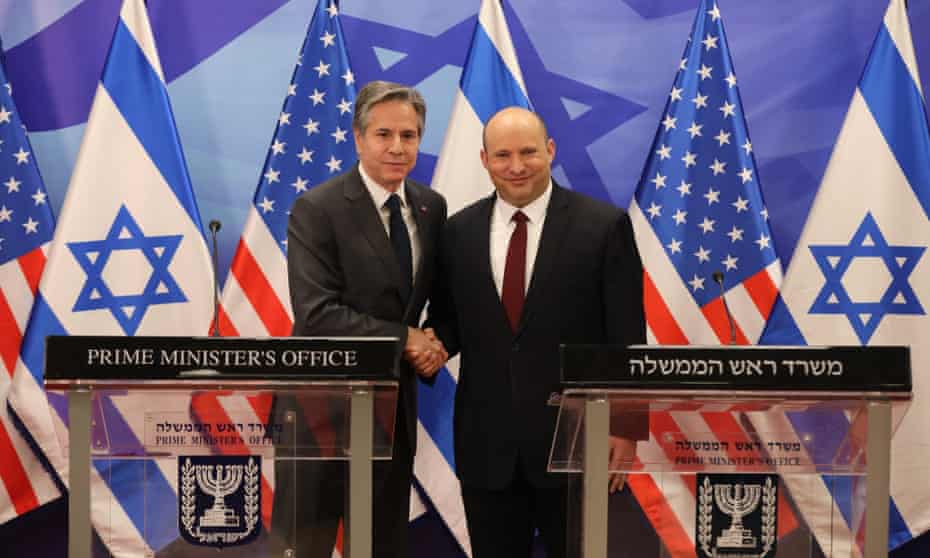
Iran will never acquire nuclear weapons, US promises Israel
Antony Blinken seeks to reassure Israel and Gulf allies ahead of possible renewal of nuclear deal
Patrick Wintour Diplomatic editorSun 27 Mar 2022 11.54 EDT
The US secretary of state, Antony Blinken, has sought to reassure Israel and its Gulf allies that Iran will never acquire atomic weapons, ahead of the possible renewal of the nuclear deal with Tehran.
“When it comes to the most important element, we see eye to eye,” Blinken said at a news conference on Sunday with Israel’s foreign minister, Yair Lapid. “We are both committed, both determined, that Iran will never acquire a nuclear weapon.”
Blinken’s comments came before a meeting with four Arab foreign ministers at an extraordinary summit hosted by Israel’s prime minister, Naftali Bennett – an event that in itself shows how the landscape of Israel’s relations with some Arab states has been transformed in the past 18 months, driven partly by fears about the imminent end of Iran’s economic isolation.
The US also sought to reassure the ad hoc alliance that Washington would not agree to Iran’s demand for the US to lift its designation of the Islamic Revolutionary Guards Corps (IRGC) as a foreign terrorist organisation.
Speaking at the Doha forum in Qatar, Robert Malley, the US special envoy on Iran, said: “This is not a deal that is intended to resolve that issue. Many in the region view the IRGC in the same way we view them. I can tell you that the IRGC will remain sanctioned under US law, and our perceptions, our views, our policy towards the IRGC have not changed.”
A senior adviser to Iran’s supreme leader insisted earlier at the same event that the removal of the IRGC from sanctions was a precondition for the revival of the 2015 nuclear deal. Talks on the deal have been under way for nearly a year in Vienna.
“The IRGC is the national army and the national army cannot be listed as a terrorist group,” said Sayyid Kamal Kharrazi. “The real thing is that IRGC is very important for Iran and they are not going to compromise on that.”
The IRGC is a centrepiece of the Iranian’s regime’s power base, and its activities in Lebanon, Yemen, Iraq and Syria have, in Iran’s eyes, been central to reducing the influence of Islamist terrorism, the US, and Gulf monarchies that depend on the US for their power.
The corps has been designated as a terrorist organisation since 2019 and had sanctions imposed upon it in 2017, but its activities across the Middle East have been kept off the table by Iran, which has insisted the agenda focus solely on the terms for America’s return to the nuclear deal.
The US walked out of the deal in 2018, leading Iran in stages to reduce its own commitments under the deal, including expanding its ability to enrich uranium.
Malley said the Biden administration could promise only that the US under its watch would remain in the deal so long as Iran remains in compliance with its terms.
Kharrazi said there were 500 other individuals and institutions subject to US sanctions that had “direct impact” on Iran’s relations with the west, and called for the US to take actions on those too.
Kharrazi, a former foreign minister, is the president of Strategic Council on Foreign Relations in Tehran and his views are closely in line with those of the Iranian regime.
Malley refused to be upbeat about a deal, saying: “We have been pretty close for some time and that I think that tells you the difficulty of the issues that remain.”
Also on Sunday, the EU’s coordinator for the nuclear talks met Iran’s foreign minister and its chief negotiator. “Working on closing the remaining gaps in the #ViennaTalks,” the EU diplomat Enrique Mora tweeted before his trip. “We must conclude this negotiation. Much is at stake.”
In the US, Republican and Democrat senators are coming together to form an alliance this week to block any recognition of the IRGC or any lifting of sanctions on the organisation.
In a joint statement last week, the Israeli prime minister and foreign minister said: “The IRGC is a terrorist organisation that has murdered thousands of people including Americans. We refuse to believe that the US would remove its designation as a terrorists organisation. The IRGC are Hezbollah in Lebanon, Jihad in Gaza, they are Houthis in Yemen, they are the militias in Iraq. They kill Jews because they are Jews, they kill Christians because they are Christian, and Muslims because they refuse to surrender to them.”
Speaking in Israel, Blinken nevertheless defended the principle of trying to revive the Iran nuclear deal, saying: “The US believes that a return to full implementation of the deal is the best way to put Iran’s nuclear programme back in the box that it was in, but has escaped from since the United States withdrew from that agreement.
“But whether there’s a deal or not, our commitment to the core principle of Iran never acquiring a nuclear weapon is unwavering. And one way or another, we will continue to coordinate closely with our Israeli partners on the way forward.”
The Israel summit was also attended by foreign ministers from Bahrain, Egypt, Morocco and the United Arab Emirates.
Malley revealed that the British have taken on the task of negotiating the release of US dual nationals still held in Iran, including Morad Tabhaz, the tri-national who was not released nearly a fortnight ago along with Nazanin Zaghari-Ratcliffe. Roxanne Tahbaz, his daughter, has accused the UK foreign secretary, Liz Truss, of a betrayal of her family.
No comments:
Post a Comment